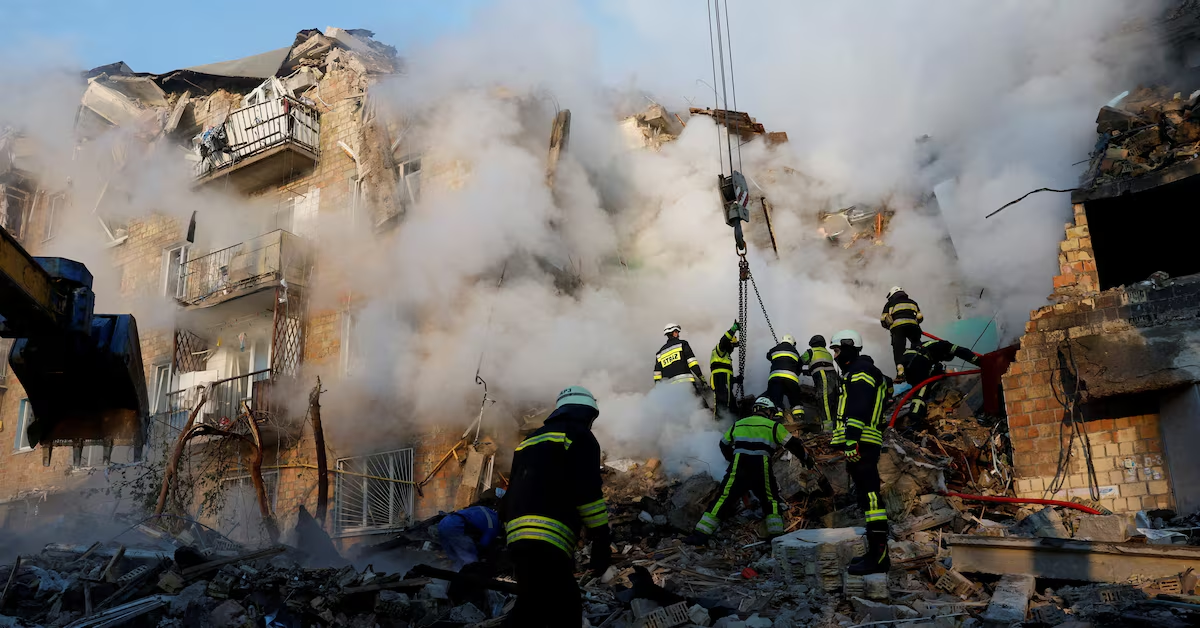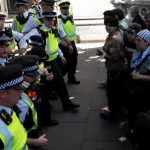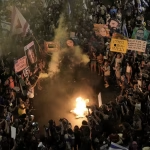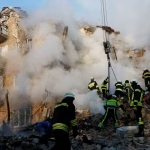The European Union is reeling from one of the most brazen attacks in recent history. Russian missile strikes have not only killed at least 23 people across multiple locations but also caused significant damage to the European Union headquarters in Brussels. The unprecedented assault has shaken Europe’s political core, uniting leaders across the continent in their condemnation of Moscow. With tensions between Russia and the West already at boiling point, this latest strike has elevated fears of a widening conflict, putting NATO and EU policymakers under mounting pressure to respond decisively.
- A Shocking Morning in Brussels
- The Human Cost – 23 Dead and Dozens Injured
- European Leaders Respond with Fury
- NATO on High Alert
- Moscow’s Denial and Defiance
- Public Outrage Across Europe
- Economic Fallout and Market Reactions
- A Turning Point in the Ukraine War
- Global Reactions
- The Future of Europe’s Security
- FAQs
- Conclusion
This article provides an in-depth, 2000-word analysis of the incident, exploring its immediate impact, the responses of European leaders, the global reactions, and the broader implications for the war in Ukraine, international diplomacy, and Europe’s future security architecture.
A Shocking Morning in Brussels
It was just after sunrise when sirens wailed across central Brussels. Residents initially thought it was another drill — the city had grown accustomed to heightened security alerts since the Ukraine war began. But within minutes, powerful explosions rocked the capital, sending shockwaves through Europe’s political hub.
Emergency crews rushed to the scene, where a portion of the EU headquarters lay in ruins. Windows were shattered across several blocks, debris covered the streets, and terrified staff were seen fleeing the building. Officials confirmed that while many were evacuated in time, several casualties occurred both inside and outside the complex.
Reports soon revealed that the Brussels strike was part of a wider Russian offensive, with coordinated missile attacks targeting multiple cities in Ukraine and spilling across borders into European territory. For the first time since World War II, Europe’s political center itself had become a battlefield.
The Human Cost – 23 Dead and Dozens Injured
Initial casualty figures confirmed that 23 people were killed and dozens injured in the strikes. Among them were EU staffers, security officers, and nearby civilians who had no connection to the political establishment.
For Europe, the deaths carry symbolic weight. They are not just numbers; they represent an attack on European sovereignty, on the ideals of democracy and unity that the EU stands for. EU Commission President Ursula von der Leyen called the victims “innocent lives lost in a brutal act of aggression against peace itself.”
Hospitals in Brussels were placed on emergency footing, while psychological counseling centers were set up to support traumatized survivors. Local residents described scenes of panic, with parents desperately searching for children and emergency vehicles overwhelming the streets.
European Leaders Respond with Fury
Within hours, European leaders delivered one of the most united condemnations in recent history.
French President Emmanuel Macron called the strike “an act of war against the European Union” and vowed that France would support decisive retaliation.
German Chancellor Olaf Scholz described it as a “red line crossed” and announced an emergency meeting with NATO partners.
Italian Prime Minister Giorgia Meloni emphasized that “no European capital is safe if aggression like this goes unchecked.”
EU Foreign Policy Chief Josep Borrell declared that Europe must “shift from defense to deterrence.”
Even leaders historically cautious about escalating tensions with Moscow, such as Hungary’s Viktor Orbán, expressed outrage. The attack has seemingly ended the political divisions that often plagued EU responses to the Ukraine war.
NATO on High Alert
NATO Secretary-General Jens Stoltenberg convened an emergency council meeting within hours of the strikes. While Article 5 — the alliance’s collective defense clause — was not immediately invoked, discussions reportedly focused on whether the Brussels attack qualifies as an attack on all NATO members.
Military analysts argue that NATO is now walking a dangerous tightrope. Direct military retaliation against Russia could trigger a global conflict, yet inaction risks emboldening Moscow to strike deeper into European territory.
Some officials floated the idea of expanding NATO’s air defense systems across European capitals, while others called for accelerating Ukraine’s membership bid as a show of defiance against Russia.
Moscow’s Denial and Defiance
In Moscow, Russian officials denied targeting the EU headquarters directly, claiming the missiles were aimed at “logistical military hubs supporting Ukraine.” Kremlin spokesperson Dmitry Peskov accused Western leaders of “manipulating tragedy to escalate war hysteria.”
Yet intelligence sources within the EU argue otherwise. Satellite data and radar imagery reportedly show that the Brussels strike was deliberate, part of a broader Russian strategy to intimidate Europe into scaling back its support for Ukraine.
President Vladimir Putin, in a televised speech, doubled down on his narrative that Russia was defending itself from Western “interference and provocation.” The speech, filled with defiance, has further hardened Europe’s resolve to push back.
Public Outrage Across Europe
European citizens poured into the streets in spontaneous demonstrations of solidarity. In Paris, thousands gathered at Place de la République holding banners reading “Europe Will Not Bow.” In Berlin, crowds marched toward the Brandenburg Gate, waving EU and Ukrainian flags side by side.
The sense of vulnerability, however, is palpable. Brussels residents expressed shock that the political heart of Europe could be directly targeted, despite heavy security measures. For many, the strike has shattered the illusion that the war in Ukraine was a distant conflict.
Economic Fallout and Market Reactions
Global financial markets reacted instantly to the news. The euro dropped against the dollar, European stock markets fell sharply, and energy prices spiked. Investors fear that the escalation could destabilize the continent’s already fragile economy, still struggling with inflation and post-pandemic recovery.
European businesses are bracing for further sanctions against Russia, which could impact trade and supply chains. Meanwhile, defense contractors saw their stock values rise, anticipating increased military spending across the EU.
A Turning Point in the Ukraine War
For over two years, the war in Ukraine has largely remained contained within its borders, albeit with massive global repercussions. The Brussels strike changes that dynamic entirely.
Experts argue that this marks the first time Russia has directly targeted the European Union itself, signaling a dangerous escalation. “This is no longer just Ukraine’s war,” said security analyst Claudia Major from the German Institute for International and Security Affairs. “It is now a European war in every sense of the word.”
Global Reactions
The United States condemned the strike in the strongest terms, with President Joe Biden calling it “an attack not just on Europe, but on democracy worldwide.” Washington pledged additional military support to both Ukraine and NATO allies in Europe.
China, in contrast, issued a carefully worded statement urging restraint from both sides but avoided directly criticizing Russia. India called for “dialogue and de-escalation,” reflecting its delicate balancing act between Western alliances and its long-standing ties with Moscow.
At the United Nations, emergency discussions took place, though divisions between Western powers and Russia made consensus difficult. Still, the symbolic weight of the Brussels strike ensures the issue will remain at the center of global diplomacy for months to come.
The Future of Europe’s Security
In practical terms, the Brussels attack is likely to accelerate Europe’s push for greater defense integration. Calls for an independent European army, long debated but rarely acted upon, are now gaining traction.
The EU is also expected to significantly increase its defense spending, with proposals for a joint missile shield, enhanced intelligence sharing, and stronger cyber defense capabilities. Leaders argue that Europe must no longer rely solely on the United States for protection.
FAQs
How many people were killed in the Russian strikes on Europe?
At least 23 people were killed, with dozens more injured.
How did European leaders react?
Leaders across the EU condemned the attack, calling it an unprecedented act of aggression and vowing a strong, united response.
Could NATO invoke Article 5 over this incident?
Discussions are ongoing. While Article 5 has not been triggered yet, many leaders consider the Brussels attack a potential red line.
What are the economic consequences of the strike?
Markets fell sharply, energy prices surged, and businesses expect further sanctions against Russia, increasing economic strain.
How does this change the Ukraine war?
The strike on Brussels marks a new phase of the conflict, directly involving Europe and making escalation more likely.
What steps is Europe likely to take next?
The EU is expected to boost defense spending, strengthen NATO cooperation, and consider new measures such as a joint missile defense system.
Conclusion
The Russian strike that killed 23 people and damaged the EU headquarters in Brussels is more than an isolated act of aggression. It is a defining moment for Europe, testing the unity, resolve, and future security architecture of the continent.
For years, Europe has spoken of “solidarity” and “shared values.” Now, those principles are being tested under fire. Whether this tragedy will push Europe toward deeper unity and stronger deterrence, or whether it will sow further division and fear, will shape the continent’s destiny for generations.
One thing is clear: the Brussels strike has erased any remaining illusions that the Ukraine war is distant or containable. The war is now at Europe’s doorstep — and Europe must decide how to respond.









